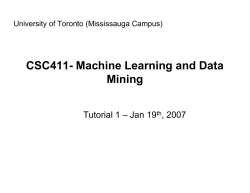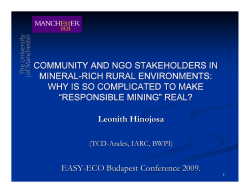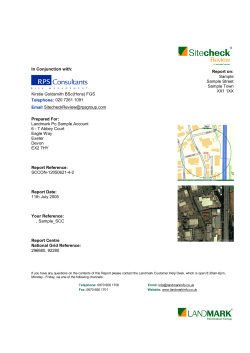
Sample Site 491044E 106946N 55225295_2 Sample_HCS
Residential Property at Sample Site Grid Reference: 491044E 106946N Order Reference: 55225295_2 Your Reference: Sample_HCS Thursday, 10 April 2014 Requested by Landmark Po Sample Account 5 - 7 Abbey Court Eagle Way Exeter Devon EX2 7HY Homecheck Professional is provided by Landmark Information Group Limited, a leading UK provider of spatially-enabled property and environmental risk information to lawyers, banks, insurance companies, home inspectors and other property professionals. The campaign for increased awareness of flood risk Join at: www.knowyourfloodrisk.co.uk Landmark Information Group works in association with: Introduction Guidance Based solely on the data contained within this report, features have been identified which could cause Ground Stability issues for the property. You should review any survey or valuation report already prepared on the property for any comment on history of settlement or subsidence in the vicinity. If a survey has not yet been commissioned it is recommended that an appropriately qualified and insured surveyor or structural engineer is consulted. Introduction The Homecheck Professional Ground Stability Report assesses whether the property is in a mining area (including past, present or proposed underground or surface mining) or an area of natural ground stability hazard. Ground Stability is one of the major causes of insurance claims - potential causes are proximity to mining, mineral extraction and natural ground subsidence. The importance of this report is to advise the user that risks are not limited to obvious coal-mining areas but also to other types of potential subsidence hazard. The report is for use by lawyers and other professionals involved in residential conveyancing. It provides information within the key areas listed below that are not covered by Standard Enquiries of Local Authorities. SUMMARY The Summary section of the report presents enquiries in a familiar and easy-to-understand question and answer format. Where a reply to an enquiry is Yes, further details are given for each question. Unless otherwise stated the answers cover a search band of 0-250 metres from the specified property. Contact details for the data providers are given in the Contacts section at the end of this report. SECTION A Mining This section concerns coal mining and mineral extraction. It is designed to highlight land instability issues which may affect the value or enjoyment of the property. SECTION B Brine and Salt Extraction This section concerns Brine and Salt Extraction. It is designed to highlight areas that may be liable to subside as a result of activities of the salt industry. SECTION C Man Made Stability Hazards This section of the report seeks to identify the existence of landfill and waste management sites together with past industrial land use. Its purpose is to highlight stability issues relating to these activities. SECTION D Natural Ground Stability Hazards This section concerns Natural Ground Stability hazards and is designed to highlight land stability issues relating to natural subsidence. Other Reports You may also wish to consider reports from our full range covering both Flood and Contamination issues. Footnotes (1) The report should only be used in connection with one residential parcel of land (for the purpose of defining a single parcel of land Rule2(2) of the Local Land Charges Act 1997 is used). The report is based on the address and grid reference shown on the cover of this report and the replies are given in reliance on the accuracy and completeness of this information. (2) The report is supplied subject to our current standard terms and conditions. (3) The search is based on a UK National Grid Reference for the property. The grid reference used is shown on the cover of this report. (4) The information in the report is supplied under licence to Landmark Information Group Limited from various sources including: Environment Agency, British Geological Survey and Ordnance Survey. (5) This report is a search of statutory and non-statutory sources of information which does not include any on-site survey or inspection of the property or its environs. Accordingly the report cannot in any way provide information as to the actual state of the property or land. (6) The replies in this report are based on information currently supplied to Landmark Information Group Limited by its data providers. Landmark Information Group cannot guarantee the accuracy or the completeness of any information supplied to it by its data providers. (7) Homecheck Professional is provided by Landmark Information Group Ltd. Order Reference 55225295_2 10-Apr-14 hcp v127.0 Page 1 Site Location N NW NE E W S SW SE Search Details Search address Sample Site Grid Reference 491044E 106946N Date of Report 10/4/2014 Order Reference 55225295_2 10-Apr-14 hcp v127.0 Page 2 Report Summary SECTION A Mining Mining Areas A.1 Is the property within an area where there has been recorded mining activity? within 0 - 250 metres? No within 0 - 25 metres? No within 0 - 250 metres? Likely Coal Mining Areas A.2 Is the property within an area where a full coal mining report should be obtained? Non-coal Mining A.3 What is the potential for ground instability relating to non-coal mining in the search area? The British Geological Survey has assessed the area of search as having a likely likelihood of property damage from subsidence relating to non-coal mining. The likely risk does not necessarily mean there is cause for concern. Inspection of the site may be required and a house buyers survey should be considered to test for signs of property damage that may relate to noncoalmining. Natural and Man-Made Cavities A.4 Are there any Natural/Man-Made Cavities identified within the search area? within 0 - 250 metres? No within 0 - 250 metres? Yes Mineral Extraction and Quarrying A.5 Are there any Mineral extraction sites as recorded by the British Geological Survey? see additional information Mining and Quarrying Activities A.6 Are there any features identified from Landmark's Potentially Contaminative Industrial Uses (Past land Use) data relating to Mining / Quarrying activities? within 0 - 250 metres? Yes see additional information SECTION B Brine and Salt Extraction B.1 Is the property within an area defined as being affected by Brine and Salt Extraction? within 0 - 250 metres? No within 0 - 250 metres? Yes SECTION C Man Made Stability Hazards Ground Stability C.1 Are there any features identified from Ordnance Survey Historical mapping which may affect Ground Stability? see additional information Landfill Sites C.2 Are there any Landfill Sites? Order Reference 55225295_2 within 0 - 250 metres? 10-Apr-14 hcp v127.0 No Page 3 Report Summary C.2.1 The following list shows if local authorities Chichester District Council - Has no landfill data to supply West Sussex County Council - Has supplied landfill data covering the area of search have made landfill data available. Please refer to the Contacts section for contact information. Licensed Waste Management Facilities C.3 Are there any currently Licensed Waste Management Facilities? within 0 - 250 metres? No within 0 - 50 metres? No Boreholes C.4 Are there any BGS Boreholes identified? SECTION D Natural Ground Stability Hazards Natural Ground Stability Hazards D.1 What is the potential for natural ground instability in the search area? High The BGS indicate that there is a high potential for natural ground instability in the search area. This does not necessarily mean there is cause for concern in terms of property stability, however we recommend that specific advice be commissioned from a qualified member of the RICS. Please refer to the Additional Information section for details of records found and details of how natural ground instability is broken down into its components. Footnotes: Question A.2 The reply to this question indicates whether it is advisable to obtain a coal mining search from the Coal Authority. Question A.3 The data provides an assessment of the likelihood that past underground mining may have occurred in the area based on information supplied by the BGS . The data takes into account many types of mining such as ironstone or limestone extraction, but specifically excludes coal. The mining hazard data includes all known underground workings, regardless of depth Question A.5 The reply to this question is based upon the BGS compendium of mines, quarries and mineral sites operating commercially in England and Wales since 1993. The original data was compiled by BGS in 1993-94 primarily from BGS records and from information supplied by local authorities, industrial sources and the Valuation Office Agency. Question A.6 Historical maps are a valuable and recognised source of information for investigating site history. They assist in identifying any previous potential contaminative uses relating to Mining / Quarrying which may have been carried out at a particular location. Question C.1 Historical maps are a valuable and recognised source of information for investigating site history. They assist in identifying any previous potential infilling of land which may have been carried out at a particular location that may affect Ground Stability. The Historical Industrial Land Use data used in this reply is the result of a systematic analysis of 1:10,560 scale Ordnance Survey maps dating from the 1880s, as well as selected 1:10,000 scale Ordnance Survey National Grid Series. Evidence of past potential contamination and potentially infilled land is drawn from a series of up to six historic map editions. The first of these editions will be the earliest County Series maps, which date from between 1860 and 1890 and are to a scale of 1:10,560. The second edition of County Series maps dates from circa 1900, and the third circa 1930. Question C.2 The Landfill Sites have been provided by the relevant environment agency or Local Authority (where available). At present no complete national data set exists for landfill site boundaries, therefore, a point grid reference, provided by the data supplier, is used for some landfill sites. In certain cases the point grid references supplied provide only an approximate position, and can vary from the site entrance to the centre of the site. For Registered Landfill Sites, where the positional accuracy of the site is unclear, a "buffer" is constructed around the point to warn of the possible presence of landfill. Question D. 1 The search band for this question is 0 - 50 metres from the specified property. If there is a positive answer to questions A5, C2, C3 or C4 the feature will be displayed on mapping in the Additional Information section. Order Reference 55225295_2 10-Apr-14 hcp v127.0 Page 4 Additional Information A.5 - Mineral Extraction and Quarrying - Records within 0 - 250m N NW NE E W S SW Order Reference 55225295_2 10-Apr-14 SE hcp v127.0 Page 5 Additional Information BGS Recorded Mineral Sites Map ID 1 Contact Number 1 Direction West Distance 75m Site Name: Pear Tree Knap Gravel Pit Location: Boxgrove, Chichester, West Sussex Source: British Geological Survey, National Geoscience Information Service Reference: 157598 Type: Opencast Status: Ceased Operator: Unknown Operator Operator Location: Periodic Type: Unknown Operator Quaternary Geology: Head Commodity: Sand and Gravel Positional Accuracy: Located by supplier to within 10m Order Reference 55225295_2 10-Apr-14 hcp v127.0 Page 6 Additional Information A.6 - Mining and Quarrying Activities - Records within 0 - 250m Potentially Contaminative Industrial Uses (Past Land Use) Direction West Distance 56m Use: Quarrying of sand & clay, operation of sand & gravel pits Date of Mapping: 1951 Order Reference 55225295_2 10-Apr-14 hcp v127.0 Page 7 Additional Information C.1 - Ground Stability - Records within 0 - 250m Potentially Infilled Land (Non-Water) Direction West Distance 56m Use: Unknown Filled Ground (Pit, quarry etc) Order Reference 55225295_2 10-Apr-14 hcp v127.0 Page 8 Additional Information D.1 - Natural Ground Stability Hazards - Records within 0 - 250m Potential for Collapsible Ground Stability Hazards Contact Number 1 Direction - Buffer: On Site Hazard Potential: Very Low Source: British Geological Survey, National Geoscience Information Service Potential for Compressible Ground Stability Hazards Contact Number 1 Direction - Buffer: On Site Hazard Potential: No Hazard Source: British Geological Survey, National Geoscience Information Service Potential for Ground Dissolution Stability Hazards Contact Number 1 Direction - Buffer: On Site Hazard Potential: High Source: British Geological Survey, National Geoscience Information Service Potential for Landslide Ground Stability Hazards Contact Number 1 Direction Buffer: On Site Hazard Potential: Very Low Source: British Geological Survey, National Geoscience Information Service Potential for Running Sand Ground Stability Hazards Contact Number 1 Direction Buffer: On Site Hazard Potential: No Hazard Source: British Geological Survey, National Geoscience Information Service Contact Number 1 Direction West Buffer: 0-50m Hazard Potential: Very Low Source: British Geological Survey, National Geoscience Information Service Potential for Shrinking or Swelling Clay Ground Stability Hazards Contact Number 1 Direction - Buffer: On Site Hazard Potential: No Hazard Source: British Geological Survey, National Geoscience Information Service Contact Number 1 Direction West Buffer: Hazard Potential: 0-50m Very Low Source: British Geological Survey, National Geoscience Information Service Order Reference 55225295_2 10-Apr-14 hcp v127.0 Page 9 Additional Information The search results for natural subsidence above indicate the likelihood of each hazard occurring within the buffer zone. An indication of a hazard does not necessarily mean that a particular property will be affected by subsidence problems, as this also depends on factors such as property type or proximity to trees. How a particular property may be affected can only be determined by a more detailed search and/or further investigation of the site and property. Shrink-Swell Clay Hazard Swelling Clays can change volume due to variation in ground moisture. This can cause ground movement, particularly in the upper 2 metres of the ground that may affect foundations. Ground moisture variations can be related to a number of factors, including weather variations (annual or longer term), vegetation effects (particularly growth or removal of trees) and man-made activity. Collapsible Ground Hazard Certain kinds of rock have an open porous structure, which means they can collapse suddenly when a load is placed on them (such as a building) or when they become saturated, causing potential damage to overlying property. Compressible Ground Hazard Certain types of ground, such as that developed beneath river plains, can contain very soft layers or pockets. These can compress under the weight of overlying structures, such as buildings, resulting in progressive depression of the ground and disturbance of foundations. Ground Dissolution Hazard Ground dissolution occurs when certain types of bedrock contain layers of material that can dissolve within the ground water. This can cause underground cavities to develop that, with time, can reach the surface and cause significant ground movement, such as development of collapse hollows that can directly impinge on buildings. Landslide Hazard Landslide hazard occurs due to particular types of slopes becoming unstable under certain circumstances, causing down-slope movement of the ground and disruption to buildings. A combination of factors, including, amongst others, the rock type, the presence of excess water (natural or relating to man-made activity), the angle of the slope, and construction work, for example, cuttings or embankments, can all contribute. Running Sand Hazard Some rocks can contain loosely packed sandy layers that can become fluidised by water flowing through them. This may happen, for example, around natural springs, or where excavations in sand go below the water table, or around leaking drains and mains water supply pipes. Such sands can 'run', removing support from overlying buildings and causing potential damage. Order Reference 55225295_2 10-Apr-14 hcp v127.0 Page 10 Contacts 1 British Geological Survey - Enquiry Service British Geological Survey Kingsley Dunham Centre Keyworth Nottingham Nottinghamshire NG12 5GG Telephone 0115 936 3143 Fax 0115 936 3276 Email enquiries@bgs.ac.uk Website www.bgs.ac.uk The BGS can provide a detailed geological report on the area in which the property is located. Chichester District Council - Environmental Health Department East Pallant House 1 East Pallant Chichester West Sussex PO19 1TY Telephone 01243 785166 Fax 01243 776766 Website www.chichester.gov.uk West Sussex County Council - Environment & Development County Hall Tower Hall Chichester West Sussex PO19 1RH Telephone 01243 777100 Website www.westsussex.gov.uk Peter Brett Associates Caversham Bridge House Waterman Place Reading Berkshire RG1 8DN Telephone 0118 950 0761 Fax 0118 959 7498 Email reading@pba.co.uk Website www.pba.co.uk The cavity data presented has been extracted from the PBA enhanced version of the original DEFRA national cavity databases. PBA/DEFRA retain the copyright & intellectual property rights in the data. Whilst all reasonable efforts are made to check that the information contained in the cavity databases is accurate we do not warrant that the data is complete or error free. The information is based upon our own researches and those collated from a number of external sources and is continually being augmented and updated by PBA. In no event shall PBA /DEFRA or Landmark be liable for any loss or damage including, without limitation, indirect or consequential loss or damage arising from the use of this data. Order Reference 55225295_2 10-Apr-14 hcp v127.0 Page 11 Contacts Ove Arup & Partners Central Square Forth Street Newcastle Upon Tyne Tyne And Wear NE1 3PL Telephone 0191 261 6080 Fax 0191 261 7879 The Data provided above was obtained on Licence from Ove Arup & Partners Limited (for further information, contact mining.review@arup.com). No reproduction or further use of such Data is to be made without the prior written consent of Ove Arup & Partners Limited. The information and data supplied in the product are derived from publicly available records and other third party sources and neither Ove Arup & Partners nor Landmark warrant the accuracy or completeness of such information or data. Wardell Armstrong LLP Sir Henry Doulton House Forge Lane Etruria Stoke On Trent ST1 5BD Telephone 0845 111 7777 Fax 0845 111 8888 Website www.wardell-armstrong.com The Data provided was obtained on Licence from Wardell Armstrong LLP, who retain the copyright and intellectual property rights in the data. The information has been derived and collated from publicly available material and in-house records which are continually being expanded and updated. Whilst due diligence has been exercised in the collation of the material, neither Wardell Armstrong LLP nor Landmark warrant the accuracy or completeness of the data and are not liable for any indirect or consequential loss or damage arising from the use of the data. Landmark Information Group Ltd - Landmark Info Helpline Legal & Financial Imperium Imperial Way Reading Berkshire RG2 0TD Telephone 0844 844 9966 Fax 0844 844 9980 Email info@landmarkinfo.co.uk Order Reference 55225295_2 10-Apr-14 hcp v127.0 Page 12 Search Code IMPORTANT CONSUMER PROTECTION INFORMATION This search has been produced by Landmark Information Group Ltd, Imperium, Imperial Way, Reading, Berkshire, RG2 0TD. Telephone: 0844 844 9966, Fax No: 0844 844 9980, email: helpdesk@landmark.co.uk which is registered with the Property Codes Compliance Board (PCCB) as a subscriber to the Search Code. The PCCB independently monitors how registered firms maintain compliance with the Code. The Search Code: - Provides protection for homebuyers, sellers, conveyancers and mortgage lenders who rely on the information included in property search reports undertaken by subscribers on residential and commercial property within the United Kingdom. - Sets out minimum standards which firms compiling and selling search reports have to meet. - Promotes the best practice and quality standards within the industry for the benefit of consumers and property professionals. - Enables consumers and property professionals to have confidence in firms which subscribe to the code, their products and services. By giving you this information, the search firm is confirming that they keep to the principles of the Code. This provides important protection for you. The Code's core principles Firms which subscribe to the Code will: - Display the Code logo prominently on their search reports. - Act with integrity and carry out work with due skill, care and diligence. - At all times maintain adequate and appropriate insurance to protect consumers. - Conduct business in an honest, fair and professional manner. - Handle complaints speedily and fairly. - Ensure that all search services comply with the law, registration rules and standards. - Monitor their compliance with the Code. COMPLAINTS If you have a query or complaint about your search, you should raise it directly with the firm, and if appropriate ask for your complaint to be considered under their formal internal complaints procedure. If you remain dissatisfied with the firm's final response after your complaint has been formally considered, or if the firm has exceeded the response timescales, you may refer your complaint for consideration under The Property Ombudsman scheme (TPOs). The Ombudsman can award compensation of up to £5,000 to you if it finds that you have suffered actual loss as a result of your search provider failing to keep to the Code. Please note that all queries or complaints regarding your search should be directed to your search provider in the first instance, not to TPOs or to the PCCB. TPOs Contact Details: The Property Ombudsman Scheme Milford House 43-55 Milford Street Salisbury Wiltshire SP1 2BP Tel: 01722 333306 Fax: 01722 332296 Email: admin@tpos.co.uk You can get more information about the PCCB from www.propertycodes.org.uk. PLEASE ASK YOUR SEARCH PROVIDER IF YOU WOULD LIKE A COPY OF THE SEARCH CODE Search Code COMPLAINTS PROCEDURE If you want to make a complaint, we will: - Acknowledge it within 5 working days of its receipt. - Normally deal with it fully and provide a final response, in writing, within 20 working days of receipt. - Keep you informed by letter, telephone or e-mail, as you prefer, if we need more time. - Provide a final response, in writing, at the latest within 40 working days of receipt. - Liaise, at your request, with anyone acting formally on your behalf. Complaints should be sent to: Head of Customer Relations Landmark Information Group Ltd Landmark UK Property Imperium Imperial Way Reading RG2 0TD Telephone: 0844 844 9966 E-mail: helpdesk@landmark.co.uk Fax: 0844 844 9980 If you are not satisfied with our final response, or if we exceed the response timescales, you may refer the complaint to The Property Ombudsman Scheme (TPOs): Tel: 01722 333306, E-mail: admin@tpos.co.uk. We will co-operate fully with the Ombudsman during an investigation and comply with his final decision. LANDMARK STANDARD TERMS & CONDITIONS Full Terms and Conditions can be found on the following link: http://www.landmarkinfo.co.uk/Terms/Show/515
© Copyright 2025












